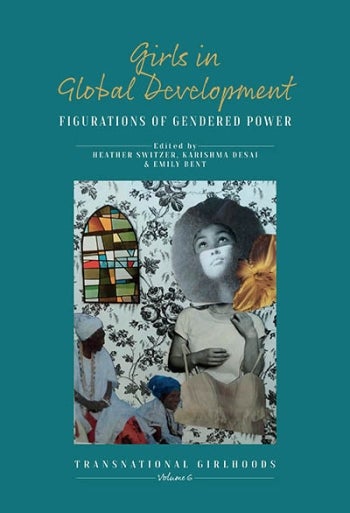ASU faculty member celebrates first anniversary of co-edited book about 'girls in development'

ASU photo
This month hosts International Day of the Girl Child, which celebrates the importance of girls all around the world and spotlights gender equality for children — a topic important to ASU's own Heather Switzer.
Last year in October, Switzer, an Arizona State University School of Social Transformation faculty member; Karishma Desai from Rutgers University–New Brunswick; and Emily Bent from Pace University celebrated the release of their co-edited book “Girls in Global Development — Figurations of Gendered Power."
To learn more about their research and how this book can impact readers, we asked the editors a few questions.
Editor's note: Answers have been edited for length and clarity.
Question: Please share an overview of the book.
Heather Switzer: This collection presents case studies from established and emerging scholars to collectively theorize and examine the concept of "girls in development" — or GID.
Emily Bent: The book is about codifying the GID paradigm, which represents a new approach to thinking about girls and their unique needs, rights and futures in a globalized context.
Q: What inspired you to write this book? Were there any personal experiences or events that influenced your writing?
Switzer: My research is centered on Maasai girls’ lives in Kenya. For this book, I really wanted to explore how scholars interested in the lives of girls in other parts of the world encountered GID as a paradigm in their own work.
Karishma Desai: My own research on cultivating life skills or what I call "affective human capital" as a form of girls’ empowerment that operates transnationally led to this editorial collaboration. I appreciate collaborative efforts and was excited to see scholars troubled by similar issues in the global move to empower girls.
Q: Were there any challenges or obstacles you faced while writing this book, and how did you overcome them?
Desai: There were global and contextual challenges because of the COVID-19 pandemic, as well as personal tragedies and transitions we encountered during this process including moves, sickness and life-altering losses. A feminist ethic of deep care that lead editor Heather anchored us in, and that we all operated with, moved us through this process.
Q: Who are your target readers, and what do you hope they will take away from your book?
Bent: The target readers are undergraduate and graduate students, advocates for human rights and global policymakers, and those who work with girls on a regular basis. I hope this book speaks to their experiences and also helps them to think beyond the "invest in girls" narrative in new and transformative ways.
Q: What advice would you give to aspiring writers?
Bent: Give yourself some grace and space! Writing takes up so much emotional space, and it is important to ground yourself in whatever way makes sense to you.
Desai: Figure out your "why" for writing what you’re writing. Realize that this may change over time. Allow your writing to change accordingly.
Switzer: Academic writing is often a solitary process. To the extent that you can, find co-authors who are also good humans and good friends.
To learn more about their work and where to purchase this book, visit Berghahn Books.
More Arts, humanities and education

ASU graduate education programs are again ranked among best
Arizona State University’s Mary Lou Fulton College for Teaching and Learning Innovation continues to be one of the best graduate colleges of education in the United States, according to the…
ASU FIDM students to see their designs on the runway at Uncertainty Fashion Showcase
Nola Hill is perfecting every stitch of her fashion design collection, which she started conceptualizing last summer.She is among 30 ASU FIDM fashion design students who have been working late into…

ASU+GSV Summit brings experts together to discuss advancements in education
Arizona State University President Michael Crow kicked off the ASU+GSV education technology summit in San Diego on Monday with a deep dive into the value of technology to address challenges in public…


